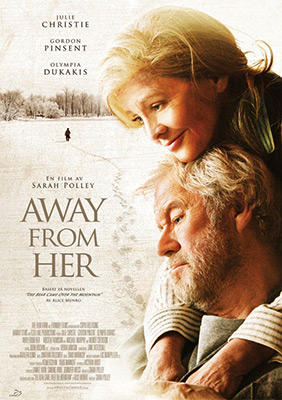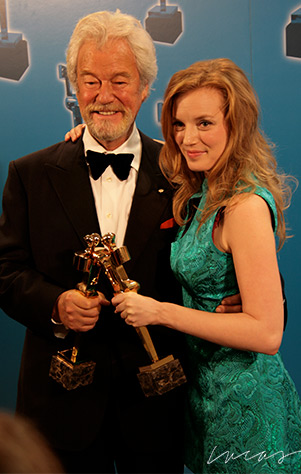Flashback: Sarah Polley in 2006
By Maurie Alioff – Québec Correspondent
(March 11, 2023 – Montréal, QC) The fate of writer-director–actress Sarah Polley’s new film, Women Talking, will be keenly watched tomorrow night when the 95th annual Academy Awards display their usual glitz and glamour. It has been nominated for Best Picture and in the Best Adapted Screenplay category for Polley’s work turning Miriam Toews’ book into a screenplay. What follows is an interview I did with Polley when she was in Montreal for a screening of her debut feature, Away from Her. The deeply moving film starred Gordon Pinsett, who died on Frebuary 25, and the onetime emblem of the sixties promisculous free-spitited sixties Julie Christie (pictured above). Pinsett character’s attempts to normalize relations with his wife are heartbreaking. The interview appeared originally in Jean-Pierre Tedros’s daily industry publication, CTVM.INFO.
Talking to Sarah Polley
Away from Her, Sarah Polley’s first feature is based on an Alice Munro story about a long-married couple whose relationship implodes when the wife, a victim of Alzheimer’s disease, leaves home for a care facility. Faithful to the source material, the movie’s strange plot developments, haunted tone, and emotional ambiguities are a long way from the crass tearjerking you might expect.
Polley’s movie is obviously not a blatant shot at box-office gold, but I think it is, in agent-speak, a smart package guaranteed to arouse audience interest. Drawn from a story by a widely read author, the project involves a respected 28-year-old actress and burgeoning director making an unusual subject choice: an offbeat love story about older people. On top of that, Polley’s cast features mythic 1960’s actress Julie Christie in her first lead role in years. What aging baby-boomer wouldn’t be at least curious about watching the onetime emblem of romantic youth playing a woman with Alzheimer’s – especially if the movie worked, and the performance clicked?
 When I asked Sarah Polley whether anyone picked up on her movie’s commercial potential before its successful opening weekend, she laughed. “God, no. I think everyone was horrified. They said you’ve chosen the most uncommercial, unlikely thing to do for your first film.” For Polley, who was in Montreal to talk up Away from Her just before its Canadian and U.S. releases widened, the film’s excellent reviews and robust attendance “goes to show that there’s no formula. In everyone’s mind this movie was laughable in terms of ever getting seen outside of one arthouse theatre in Toronto.” In fact, the release’s first week earned a per screen average of $10,100 in Canada and almost half a million in American ticket sales.
When I asked Sarah Polley whether anyone picked up on her movie’s commercial potential before its successful opening weekend, she laughed. “God, no. I think everyone was horrified. They said you’ve chosen the most uncommercial, unlikely thing to do for your first film.” For Polley, who was in Montreal to talk up Away from Her just before its Canadian and U.S. releases widened, the film’s excellent reviews and robust attendance “goes to show that there’s no formula. In everyone’s mind this movie was laughable in terms of ever getting seen outside of one arthouse theatre in Toronto.” In fact, the release’s first week earned a per screen average of $10,100 in Canada and almost half a million in American ticket sales.
Sadly, most English-language Canadian films do fade away in one Toronto theatre. When Polley addresses the problem, there’s a hint of angry impatience in her voice. “So much has to change at every single level. In everything from distribution to exhibition, there have to be huge shifts. There has to be political will to do it, and there has to be fighting for it. Right now there’s neither. It’s very hard for me to see how things are going to fundamentally change.”
Making it clear that she’s “speaking about English Canada because I don’t know enough about Quebec,” Polley finds it ludicrous that industry types keeping pining for hits like The Full Monty or 4 Weddings and a Funeral. “We actually may well have had those films ten times over in the last twenty years, but if they did exist, they were buried” without decent marketing and exhibition.

Certain that reforms to the film industry must be “handed down” in the same way that the Canadian music industry was once regulated, Polley believes that people in the business are just waking up from a protracted delusion. The real dreamers are not hardcore auteurists, but those who believe that “with a 100th of the marketing budget, we can somehow compete with giant studio films. What we can realistically compete with are independent films. The most romantic, absurd idea is that foolproof can take on a giant film with Tom Cruise in it.” During he past few years, Canada’s tradition of individualistic filmmaking was disrupted, Polley believes, and its reputation on the international scene faded. “There was a real desert, and I think we’re just hopefully beginning to recover from that”
While many players, including funding agency types, believe that stronger scripts would lead to more potent films, Polley challenges this conventional wisdom. “I don’t agree,” she argues, “that we produce substandard scripts. I feel that I read great scripts in Canada every year.
“I also feel that generally in this country we place too much emphasis on the script and not enough on the creative team. We’ve decided that it’s all about the screenplay, and that’s simply not my experience being involved in films. I’ve been in great films that come from shells of scripts that would never get financed in this country, and I’ve been in terrible films that had really brilliant screenplays. I feel that actually we should be looking more at the filmmaker and filmmaker’s visions than we should be looking at screenplays.”
Polley recalls that after the success of Deepa Mehta’s film Water, the veteran director asked Telefilm Canada for $3,000,000 to make an improvisational film. The agency, which did support Away from Me, “turned Mehta down because they didn’t see enough of a script. I think you have to say at some point, this person has a track record. This is a different kind of film that’s going to be based on improvisation. Let’s trust that person as opposed to what’s on the page, which sometimes can be meaningless.”
As a writer, Polley is disturbed by the average script reader’s need for stories to reach neat conclusions. “But in fact, all of my favourite films have huge questions that never get answered. That’s life, isn’t it? This idea that everything gets didactically explained makes for a very uninteresting film.”
While Polley’s adaptation of Munro’s story offers a little more story resolution in its last act, overall, the movie works up a haze of ambiguities. Memories are “murky and subjective,” says Polley. Moreover, Julie Christie’s Alzheimer victim Fiona might be a little sadistic in the way her faltering memory torments her husband Grant (Gordon Pinsett). Grant is an ex-university professor who was once a serial adulterer and whose current love and devotion may not be entirely pure.
At the end of the movie, says Polley, “There’s a moment of grace, but I don’t know what happens after that moment”
Editor’s note: Away from Her won seven Genie Awards including Best Picture, Best Director, Best Actor and Best Actress. Northernstars™ chose Away From Her as one of its Top 10 Canadian Films of the Decade in December of 2009.
Also see: Sarah Polley’s filmography.
![]() Maurie Alioff is a film journalist, critic, screenwriter and media columnist. He has written for radio and television and taught screenwriting at Montreal’s Vanier College. A former editor for Cinema Canada and Take One, as well as other magazines, he is affiliated with the Quebec media industry publication, CTVM.Info. His articles have appeared in various publications, including Canadian Cinematographer, POV Magazine, and The New York Times. He is the Québec Correspondent for northernstars.ca.
Maurie Alioff is a film journalist, critic, screenwriter and media columnist. He has written for radio and television and taught screenwriting at Montreal’s Vanier College. A former editor for Cinema Canada and Take One, as well as other magazines, he is affiliated with the Quebec media industry publication, CTVM.Info. His articles have appeared in various publications, including Canadian Cinematographer, POV Magazine, and The New York Times. He is the Québec Correspondent for northernstars.ca.


